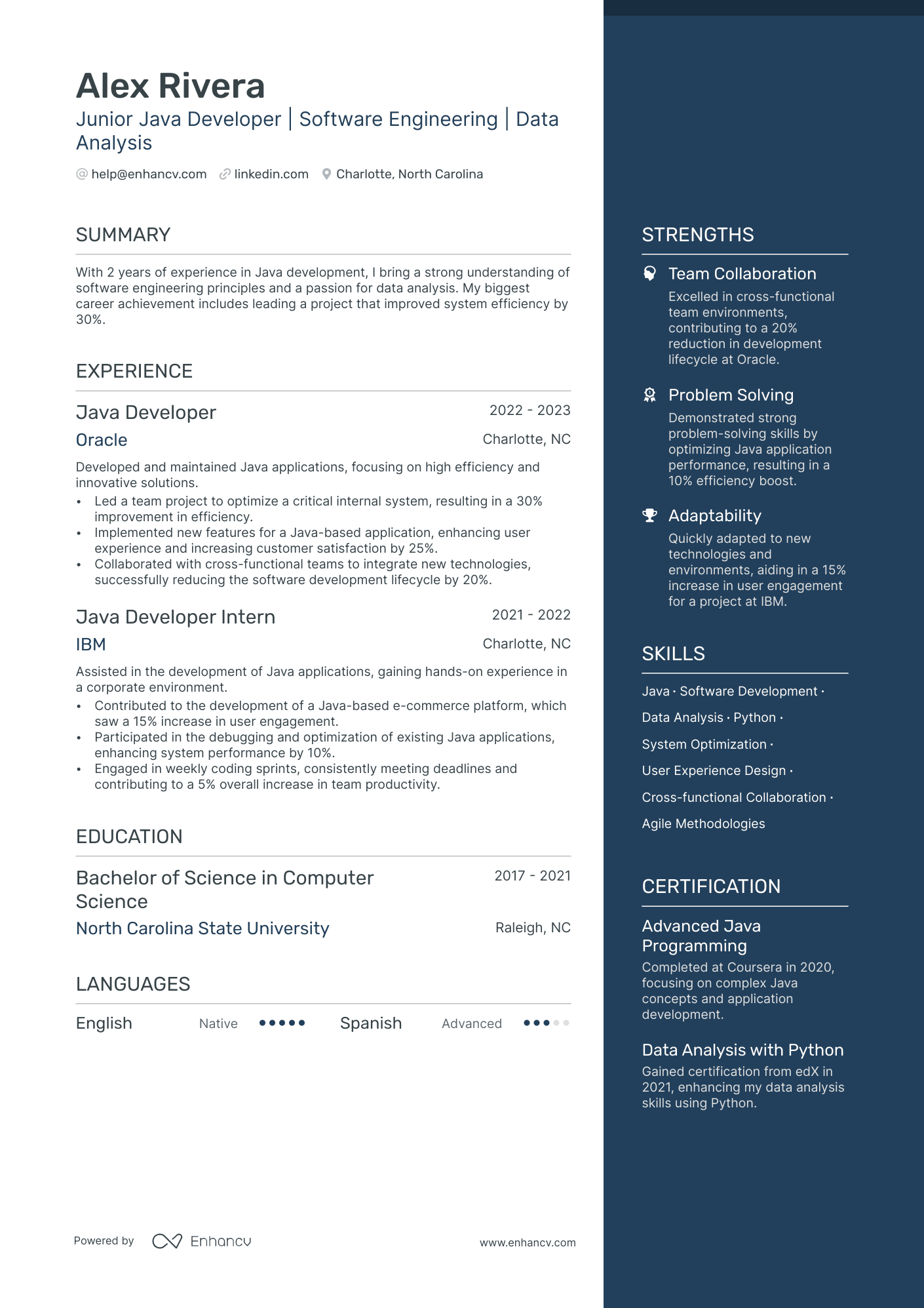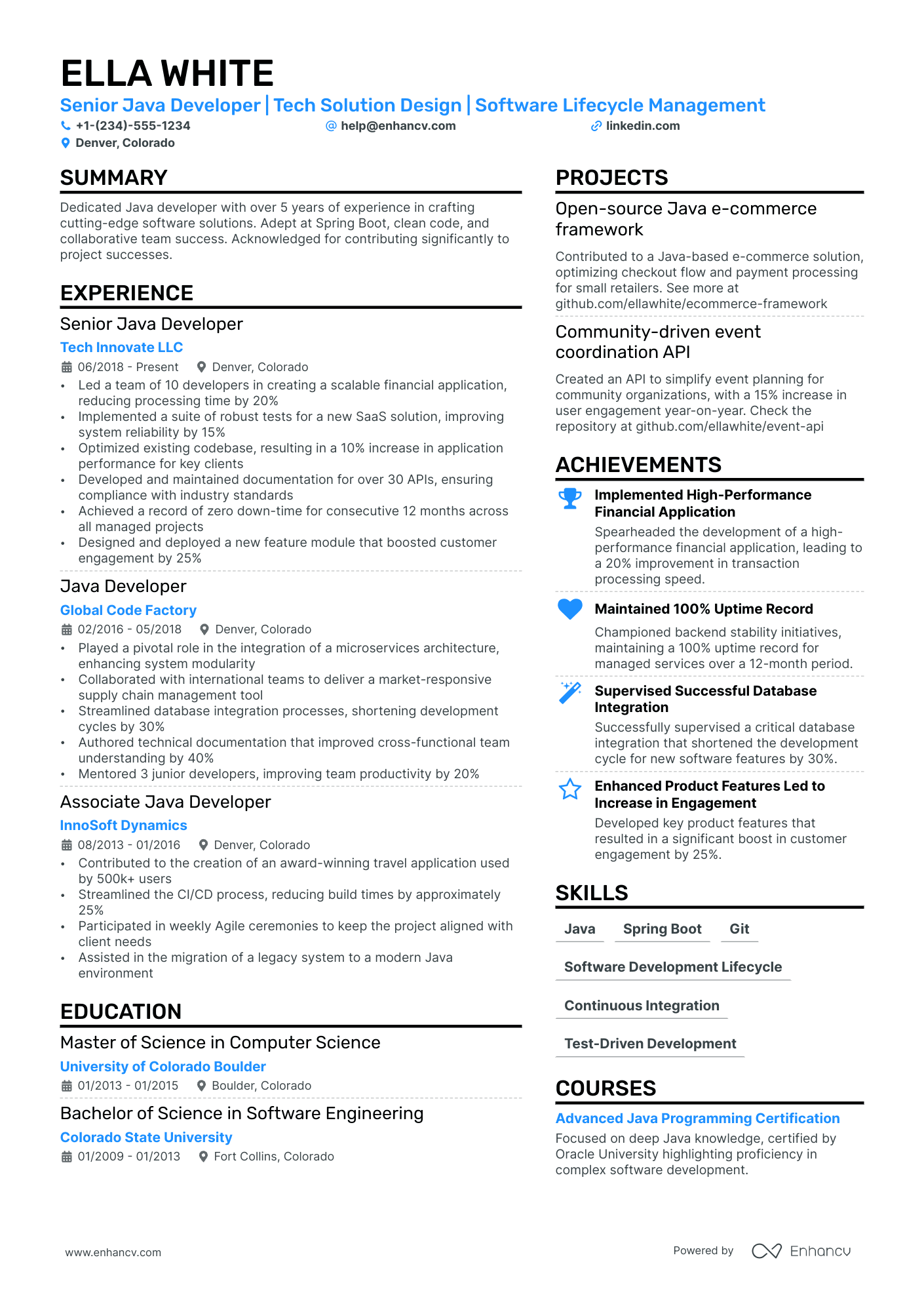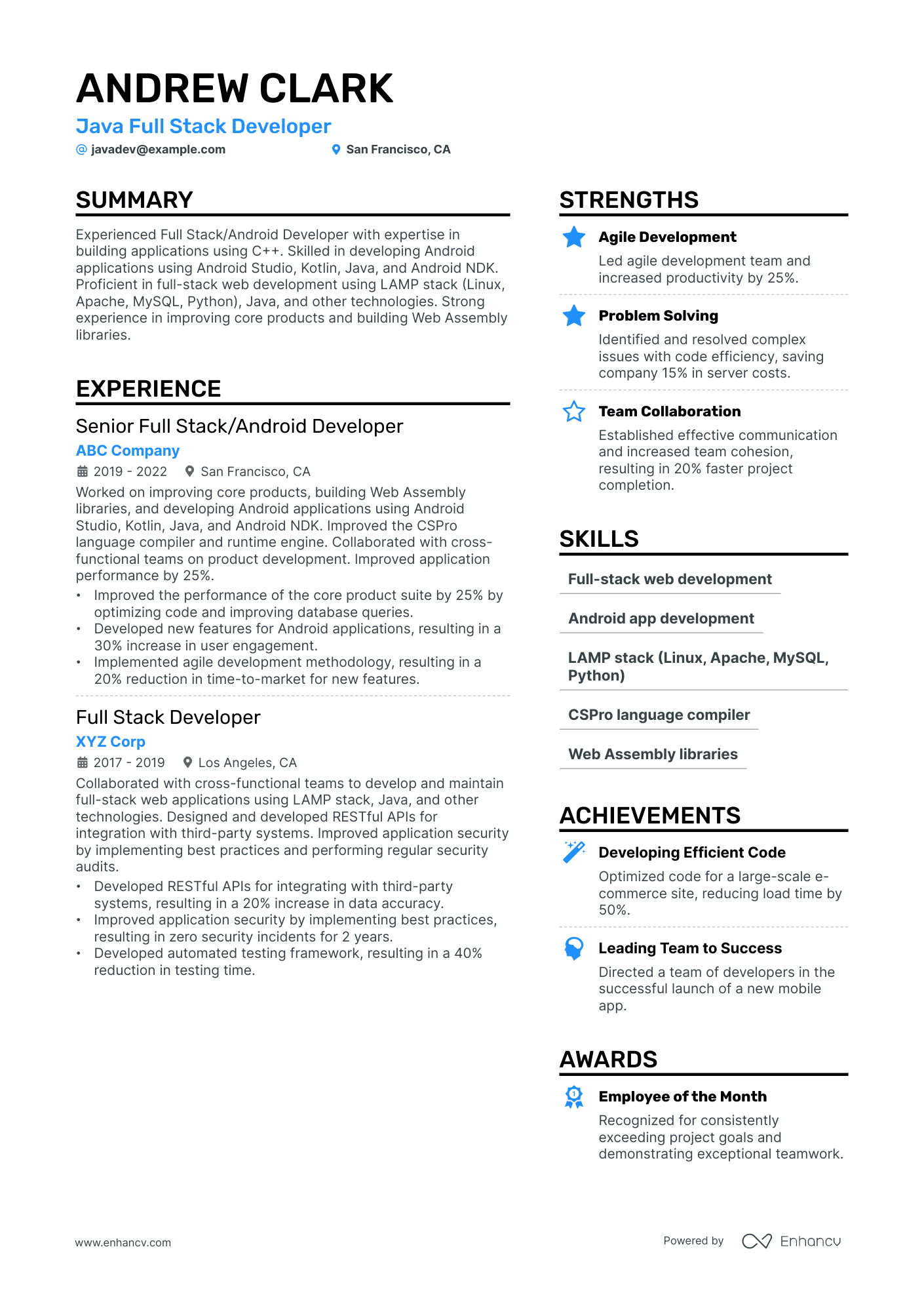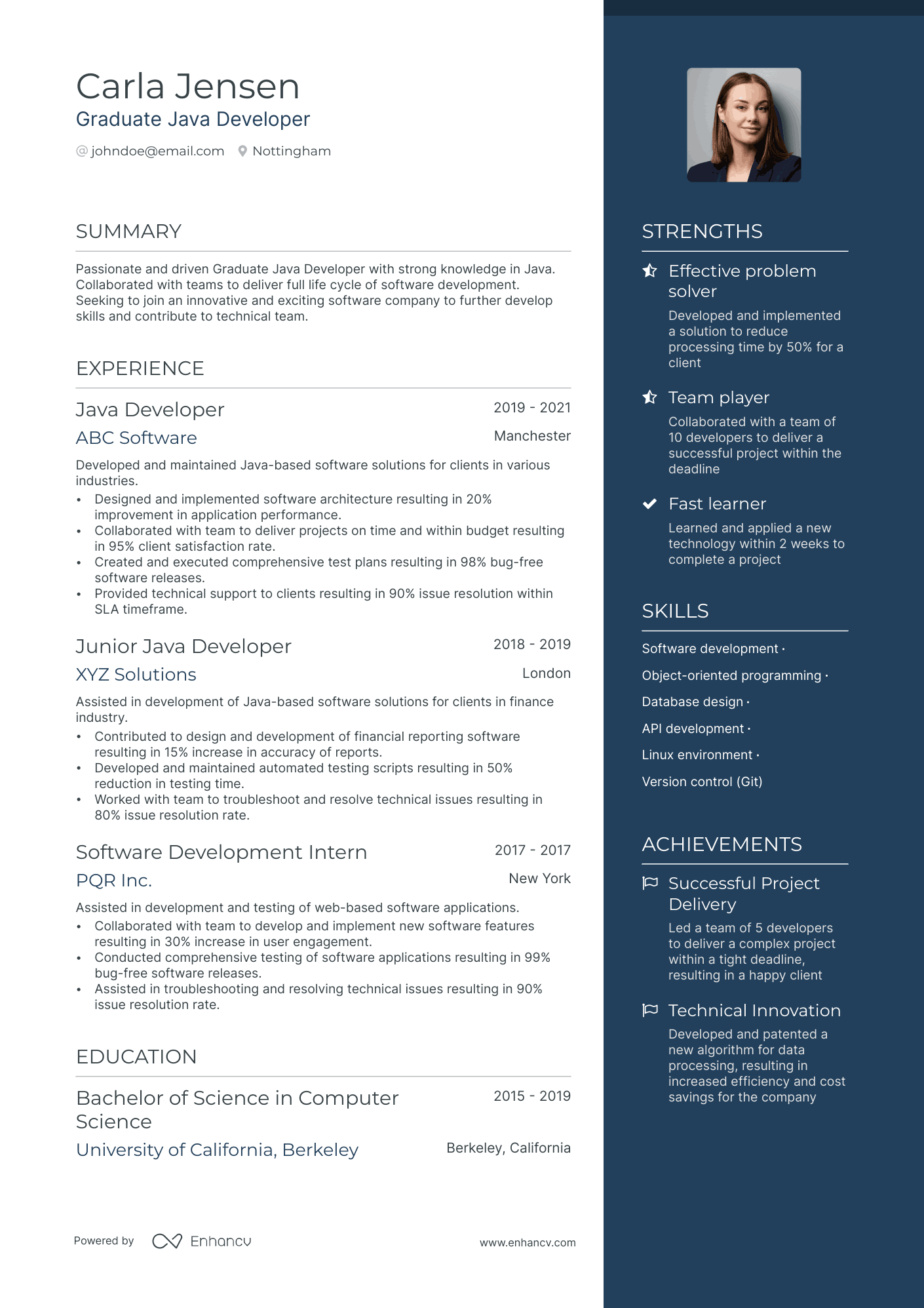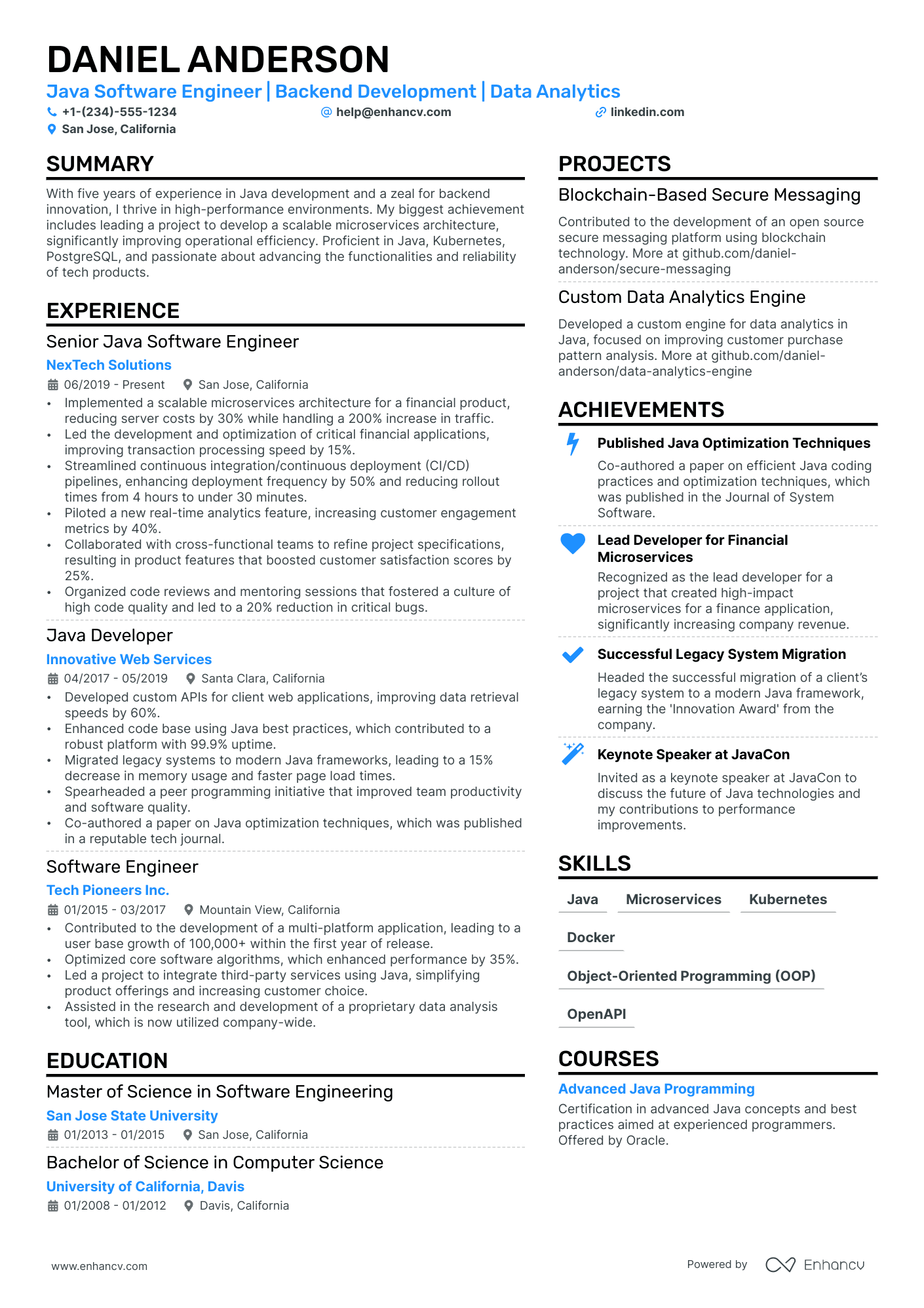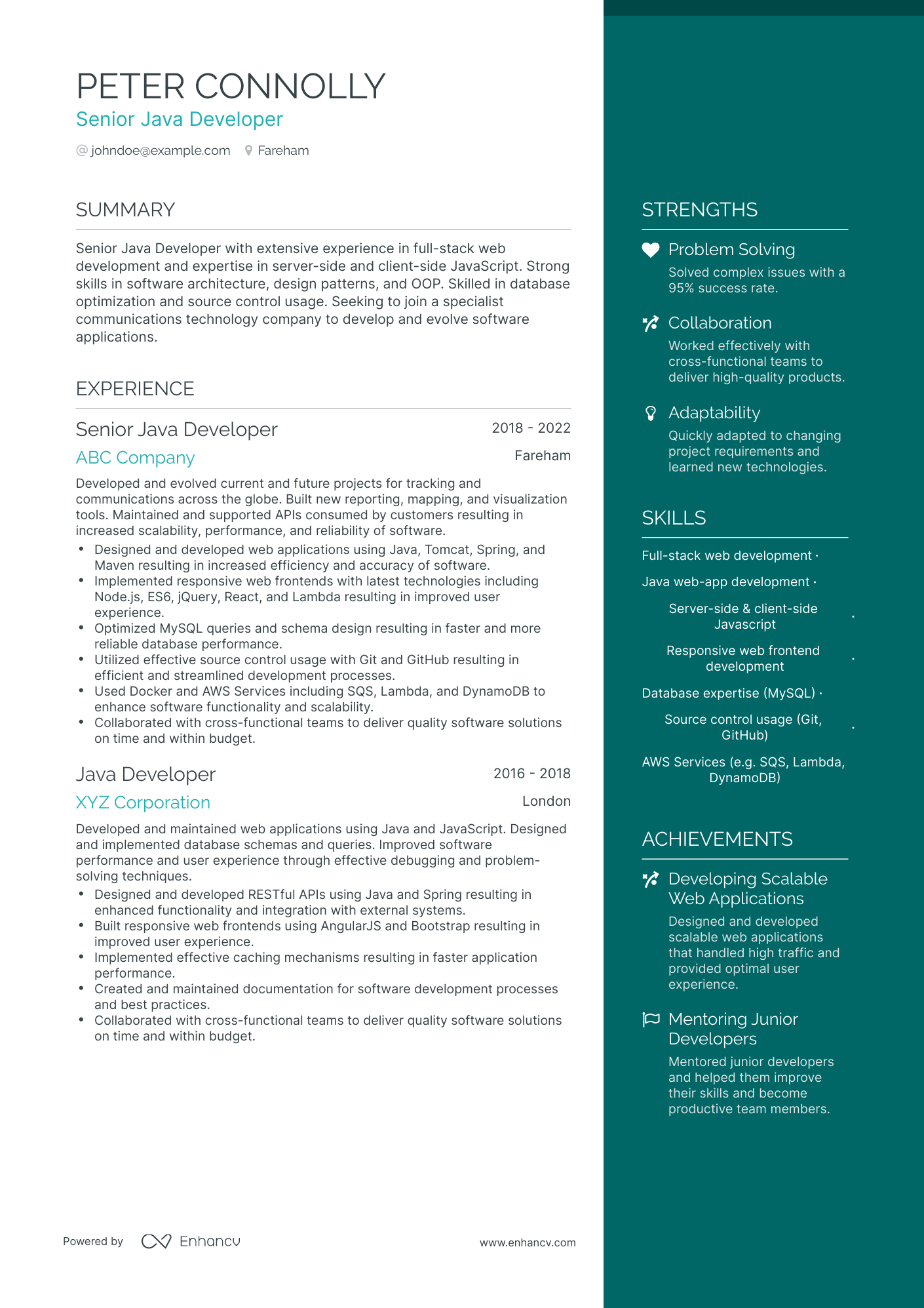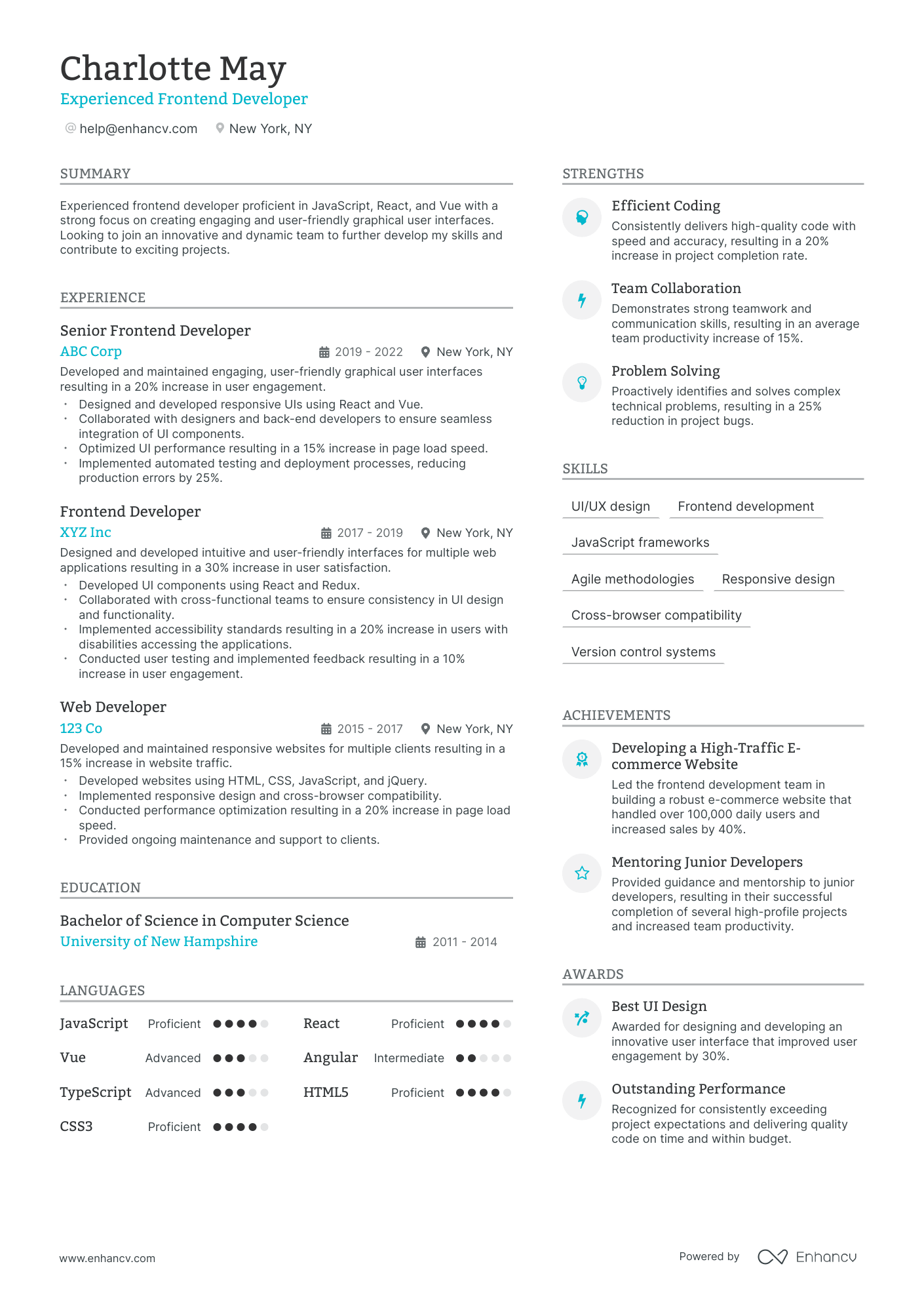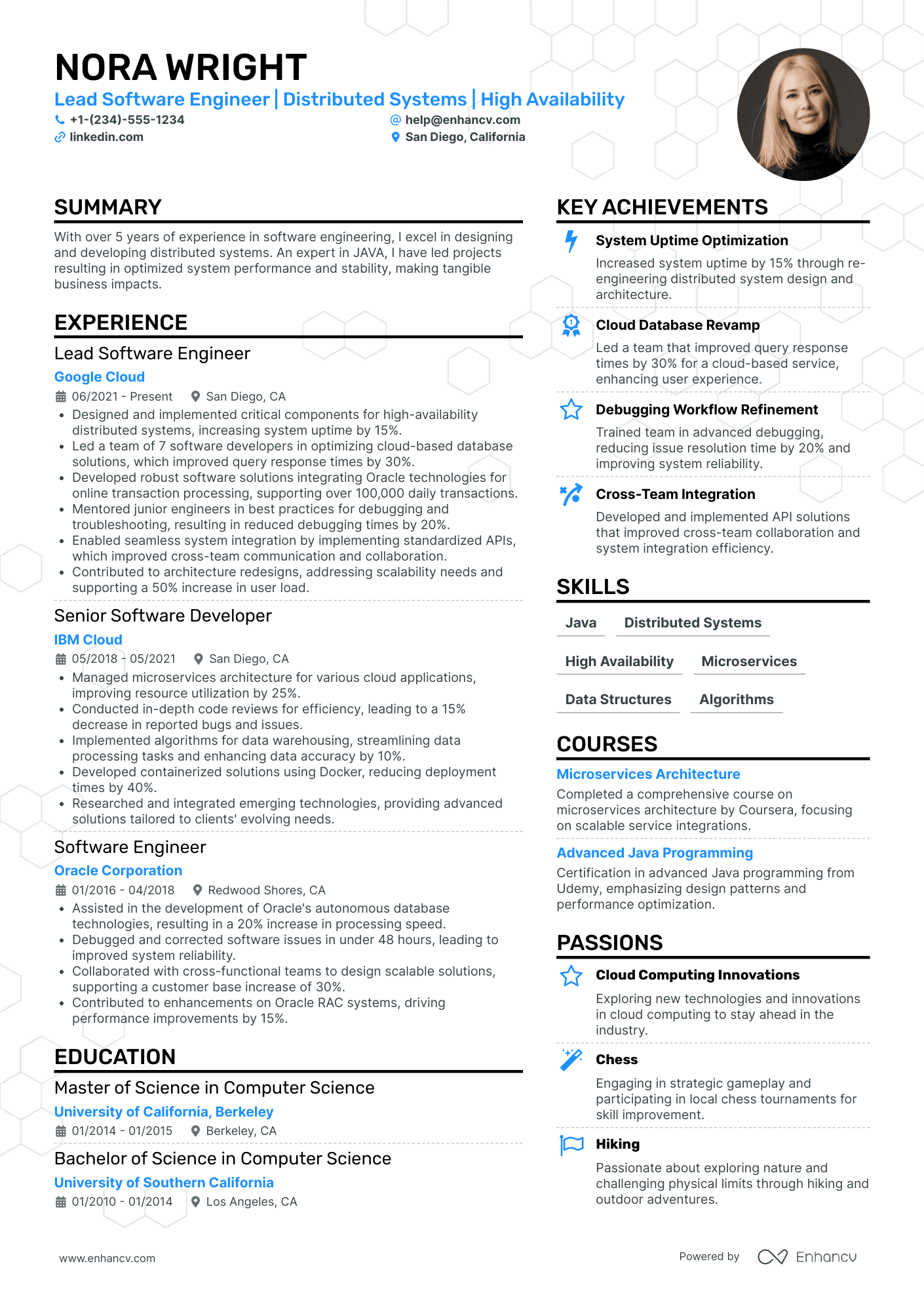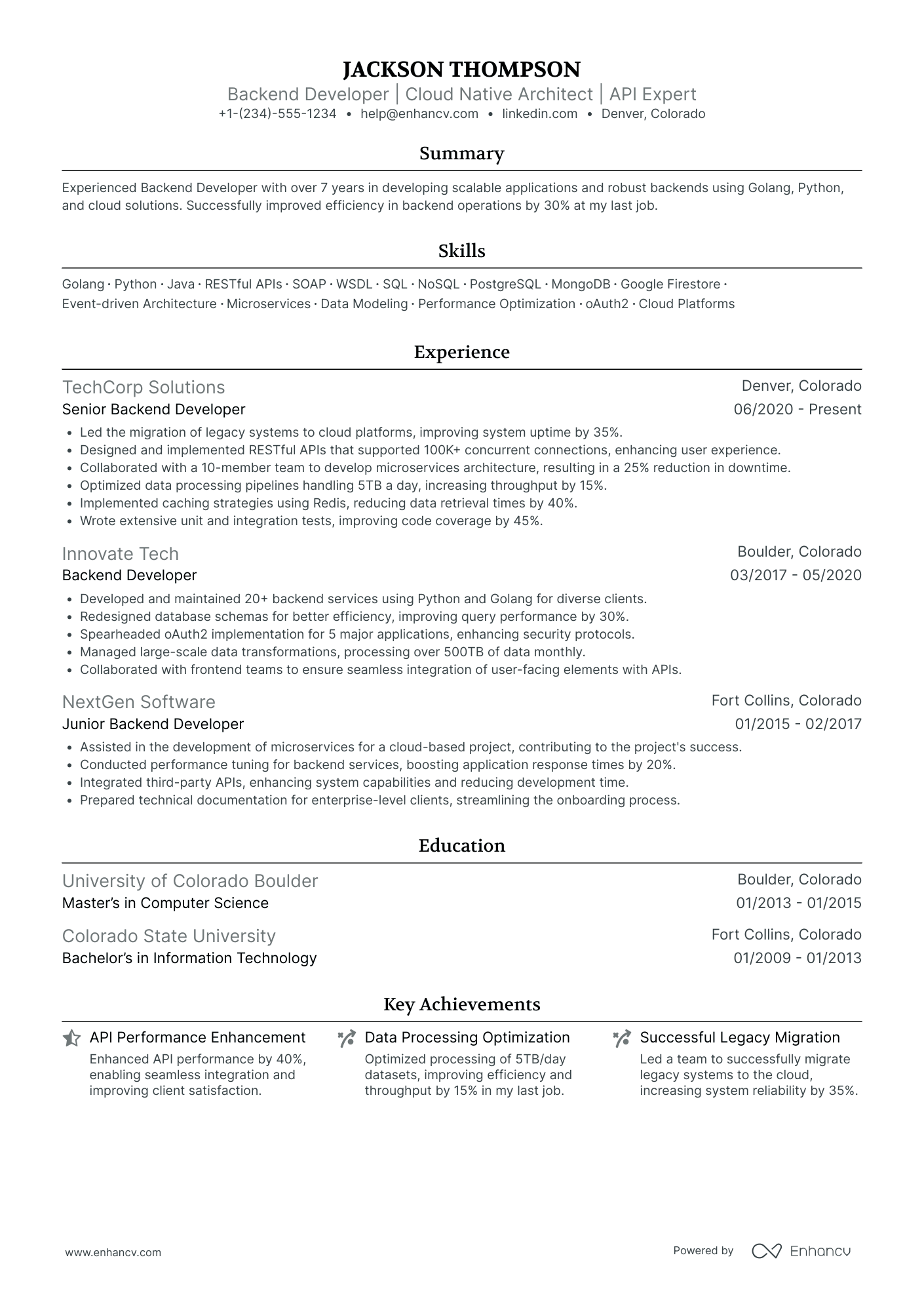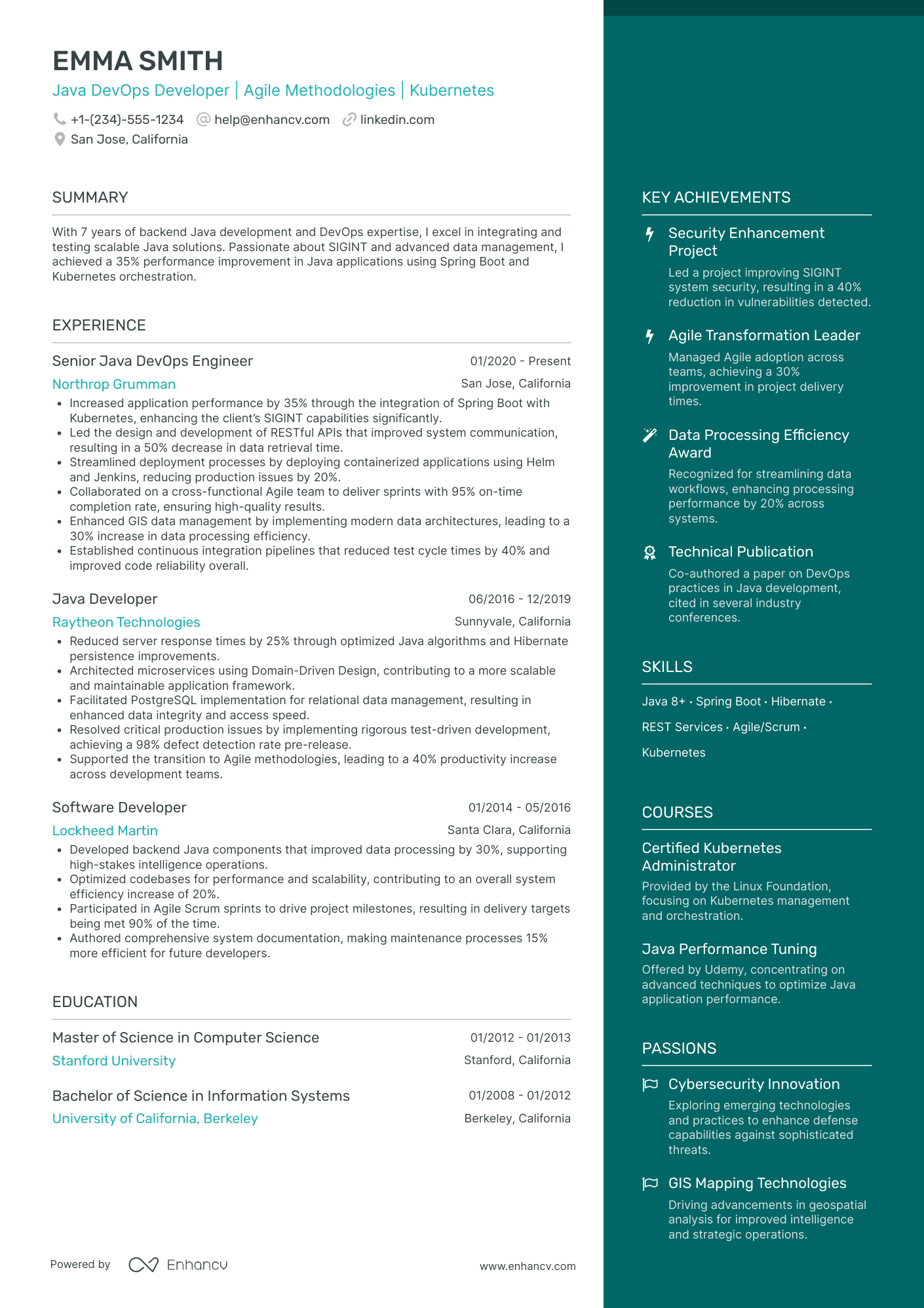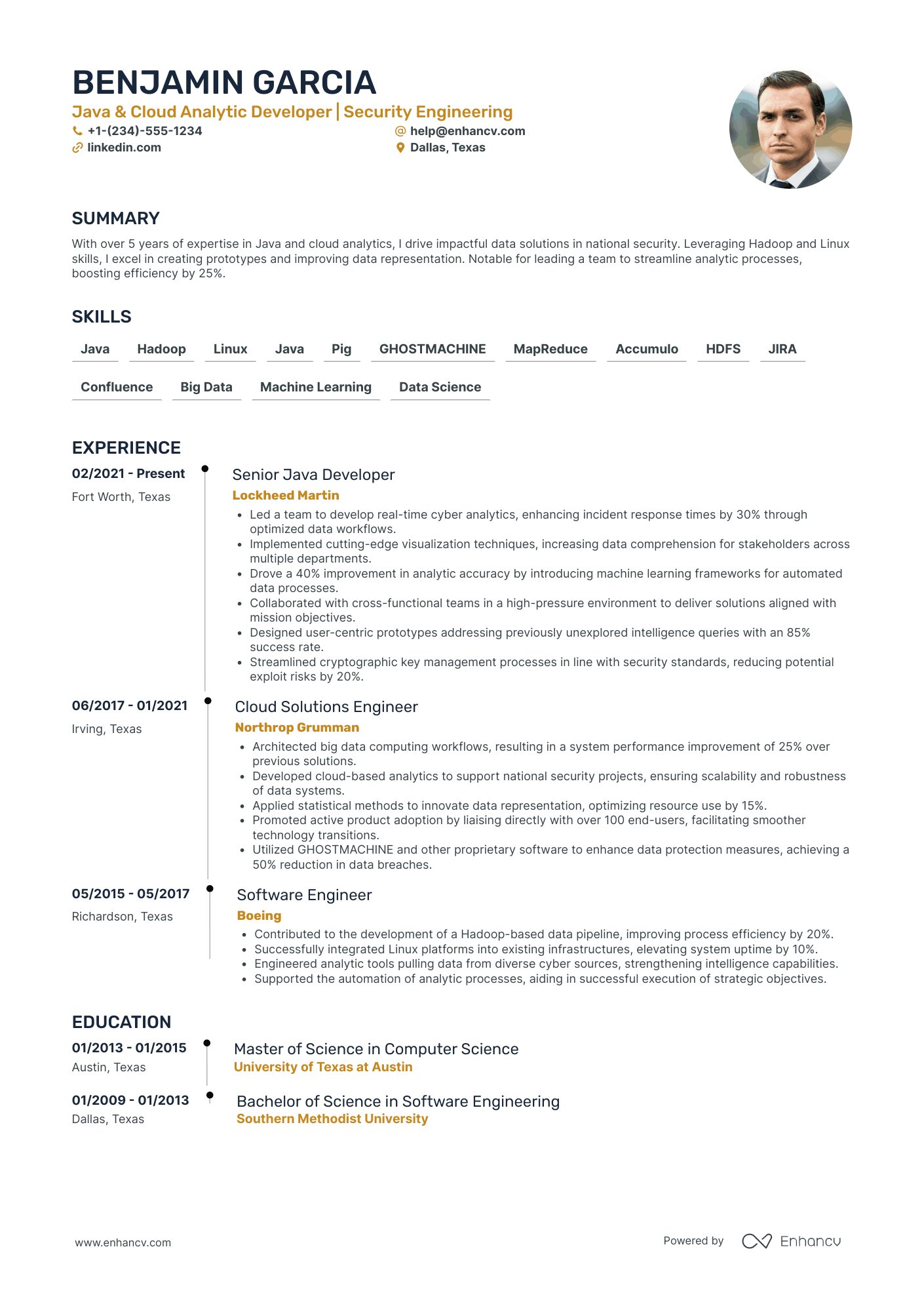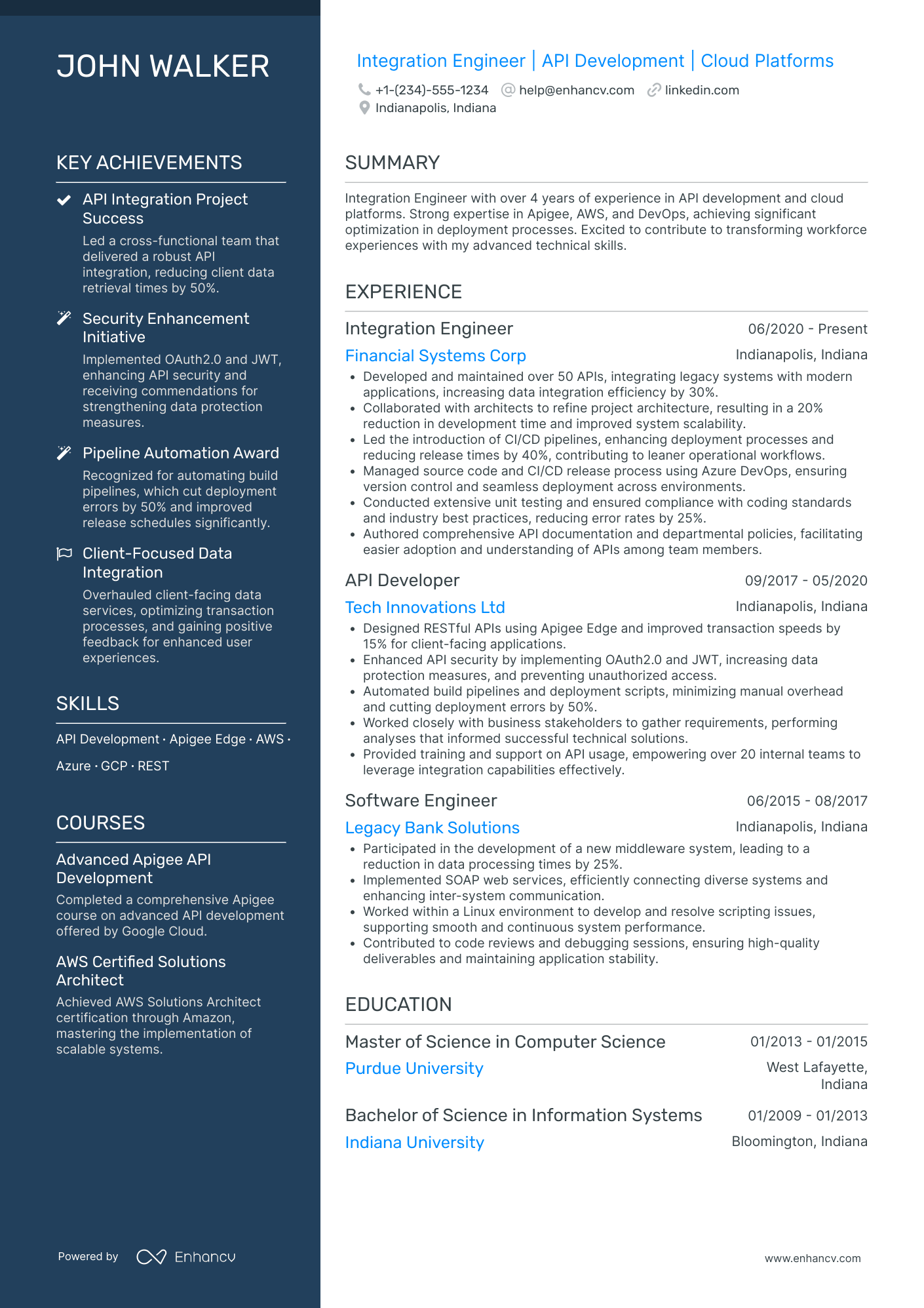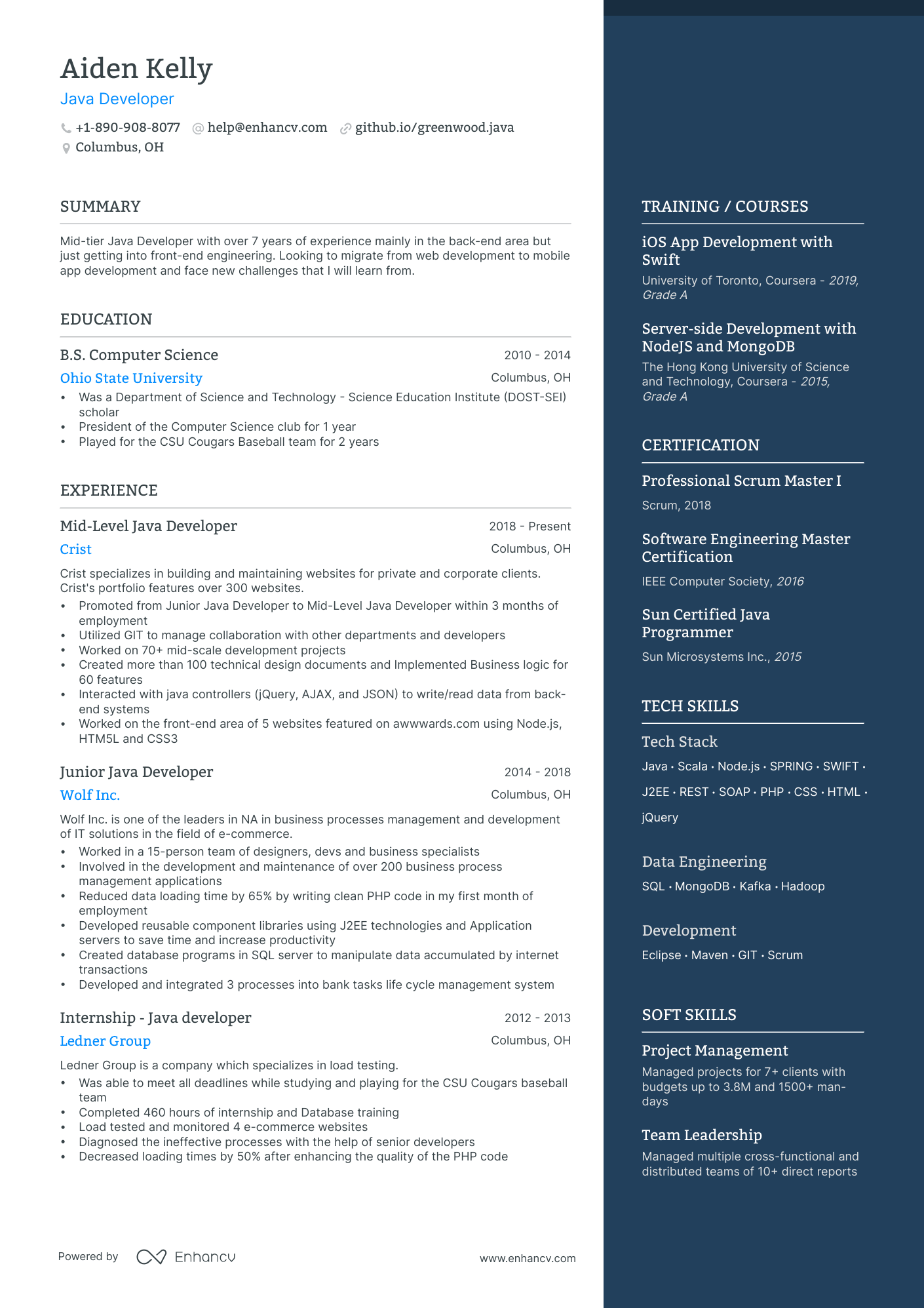Writing a compelling Java developer resume can be tricky. Thanks to Java's versatility, it's among the software industry's most prevalent programming languages. That means your skills as a Java developer are in high demand, yet it can be challenging to land a position. An unfocused, lengthy resume could be the thing holding you back.
The widespread use of Java means developers come from diverse backgrounds and with a multitude of specialized skills. One common mistake Java developers make is including too much unrelated information and excessive examples on their resumes.
Selecting which skills and experience to highlight on your resume requires research and knowledge of how employers review developer resumes. This guide, which includes pro tips and resume examples, will help you better understand how to:
- Format your resume for increased ATS optimization.
- Select, organize, and showcase your most relevant hard and soft skills.
- Include quantifiable evidence supporting your skills.
- Write a summary or objectives section that efficiently gives context to the information found on your resume.
- Implement keyword strategies to ensure your resume gets reviewed by hiring companies.
- Create a projects section to share high-quality samples of your work.
Many specialized roles exist within Java development. Explore these examples of resumes tailored to particular Java developer positions.
- Junior Java developer Resume Examples
- Java Software Engineer Resume Examples
- Java developer Cover Letter Example
Java developer resume example
Here’s what this applicant does well in their resume:
- Clear Career Progression: The applicant's experience section shows a clear progression from an internship to junior roles, and then to a mid-level Java developer position. This trajectory demonstrates their growing expertise and commitment to the field.
- Relevant Technical Skills: The resume lists an extensive range of technical skills, including Java, Node.js, SQL, MongoDB, and various development tools, which are crucial for the role of a Java developer. This showcases their technical proficiency and aligns well with the job requirements.
- Highlighting Achievements: In each role, the applicant has highlighted key achievements, such as reducing data loading time, managing large-scale projects, and improving processes. This approach emphasizes results and the impact of their work, rather than just listing responsibilities.
- Certifications and Continuous Learning: The inclusion of relevant certifications like the Professional Scrum Master and Sun Certified Java Programmer, along with ongoing education in iOS App Development and Server-side Development, shows a commitment to staying updated in the field.
How to format a Java developer resume
It's becoming an industry standard for employers to use Applicant Tracking Systems (ATS) to analyze developer resumes. ATS analyzes text on resumes by searching for specific keywords relating to desirable skills and qualifications. They then sort and prioritize resumes for review by employers, prioritizing candidates with the most relevant experience according to their resumes.
Formatting plays a crucial role in Java developer resumes by enabling ATS to recognize and pull information related to key skills and experiences. Understanding the impact of formatting on ATS analyses improves your resume's chances of being viewed by an employer.
Consider the following best practices as you format your Java developer resume:
- Creative Elements: Include creative elements, such as colors, decorative patterns, or a header photo, to make your resume unique and memorable. Avoid using creative features within text, such as emojis and non-standard date formats, as these can impede an ATS' ability to recognize it.
- Font Selection: Select ATS-friendly fonts that match the overall theme of your resume. Examples of ATS-friendly fonts are Serif and Sans-serif, Aria, and Times New Roman. However, these commonly used fonts can be boring or generic. For more creative options available on the Enhancv Resume Builder, try Rubik, Lato, Montserrat, Raleway, Exo 2, and Volkhov.
- Header Content: A prominent header featuring your name, desired job title, and contact informationlets employers view them at a glance.
- Section Headings and Subheadings: Section Headings and Subheadings: Ensure all resume sections are logically organized and include clear, accurate headings. Using standard section titles allows ATS to recognize the content easily and accurately.
- Ordering: List examples of past achievements in reverse chronological order so your most recent and relevant examples appear first.
- Document Type: Doc or PDF files are standard for resumes and most easily analyzed by ATS.
To ensure accurate recognition of the information within your resume, use the following top-recommended sections for Java developer resumes.
Targeting Canada? – Keep in mind their resume layout may differ from others.
Is your resume good enough?
Drop your resume here or choose a file. PDF & DOCX only. Max 2MB file size.
The top sections on a Java developer resume:
- Technical Skills Section: Demonstrates proficiency in Java and related technologies.
- Professional Experience: Highlights relevant Java development projects and roles.
- Education and Certifications: Showcases formal training and Java certifications.
- Java-specific Achievements: Displays notable accomplishments in Java development.
- Open Source Contributions: Reflects involvement in Java community projects.
What recruiters want to see on your resume:
- Proficiency in Java and related frameworks: Recruiters look for demonstrated skills in Java and frameworks like Spring and Hibernate, which are critical for effective software development.
- Experience with software development lifecycle: Understanding of the entire software development process, from requirement analysis to deployment, is essential for a Java developer.
- Problem-solving abilities: Java developers must be adept at solving complex problems, a skill highly valued by recruiters.
- Familiarity with database technologies: Knowledge of SQL and NoSQL databases is important as Java developers often interact with databases.
- Collaboration and communication skills: Recruiters prioritize candidates who can effectively work in teams and communicate their ideas, as development projects usually involve collaboration.
How to write your Java developer resume experience
The experience section details your relevant work history. Relevance is an essential factor for Java developers since the widespread use of Java means developers often have a variety of experiences that demonstrate their skills but don’t necessarily align with a particular role.
Since employers use this section to determine how closely your work experience fits an open position and to understand your career progression, it's a mistake to include your entire work history. A lengthy experience list requires employers to sift through and discern their relevance themselves. Employers could then assume, incorrectly, that your experiences don't make you a good fit.
Create a targeted experience section by only including past jobs that demonstrate knowledge abilities outlined in the description of the available position, allowing employers to recognize relevant experiences quickly.
PRO TIP
To target your Java developer resume for each new application quickly and easily:
- Create a resume template that includes all your experiences and skills.
- Make a copy of the template each time you apply for a position.
- In the new document, delete all irrelevant experience examples.
- Edit the remaining examples to include keywords from the job description.
When determining relevance, remember Java development requires current knowledge of industry technology. Therefore, outdated experience examples could be considered irrelevant by employers.
To better understand how to target an experience section, compare the value of these experiences examples for a role requiring an “expertise implementing API.”
- •Used Java programming language and frameworks to create GUIs.
- •Designed and implemented functional and aesthetically pleasing user interfaces.
- •Worked with business analysts to understand user requirements and translated them into technical specifications.
- •Developed and tested GUIs to ensure that they met user requirements and worked as expected.
Although this is a senior developer role, the specialization in GUI instead of API, as stated in the job description, makes this resume example less relevant than one that demonstrates expertise working with APIs.
- •Responsible for the design and development of microservices for highly efficient protocol translation and enrichment with reactive design patterns
- •Delivered end-to-end solutions for Payment APIs and developed high throughput and high-volume transaction APIs that can be consumed by omni channel platforms
- •Enhanced API solutions to offer simple, easy-to-consume APIs for payment customers
- •Participated in the development of roadmap and strategies for documenting and presenting API specifications in an easy and consumable format
This example is perfect for a resume targeted for a Java developer position requiring expertise in API since it describes specific examples of working with APIs, such as increasing efficiency and developing documentation strategies.
How to quantify the impact on your resume
You can boost the impact of your Java developer resume by including quantifiable evidence in your experience descriptions. Using quantifiable evidence means including tangible, measurable, or verifiable details that support your claims of having particular skills and knowledge.
For example, stating that you have experience in Java for cloud computing is less effective than sharing a project in which you used Java to decrease the workload of a cloud server by 20%.
Numbers and statistics are excellent ways to quantify skills. Here are some specific examples of ways to use quantifiable evidence to demonstrate your skills:
- Experienced developers can establish expertise by stating how many years of experience they have as a Java developer.
- Sharing the size of development teams you've worked with shows your ability to collaborate effectively.
- The number of projects you've completed highlights your productivity and project completion rate.
- Percentages used to describe increases in application performance as a result of your efforts to showcase efficiency optimization skills..
- Describe the size or complexity of databases you’ve worked with to illustrate your ability to handle large or complex data sets.
- Substantiate the impact of your work by detailing the number of users who've accessed your deployed applications.
- How many lines of code you’ve contributed to open-source Java projects verifies skill and community involvement.
- Reductions in bug count or system downtime resulting from your solutions emphasize your problem-solving skills and efficiency.
Examples like these allow the data on your resume to showcase your skills and provide potential employers with evidence of your qualifications and abilities.
How do I write a Java developer resume with no experience
Writing a Java developer resume with no prior developer experience can be intimidating. However, there are many ways to demonstrate your abilities and potential for success through alternative Java experience examples.
Follow these steps to write your experience sections without previous Java developer experience:
- Compile a list of keywords from the job description.
- Brainstorm previous experiences in your non-developer career, educational background, or personal life that showcase the same skills and knowledge from your list of keywords.
- Include non-development experiences exhibiting transferable skills.
- Include tangible evidence in other sections of your resume, such as certifications and projects, to add credibility.
Remember that lack of employment experience in Java development doesn’t mean you don’t already have the necessary skills and knowledge to be successful. Some employers even prefer candidates with alternative backgrounds for their unique skills and fresh perspectives.
PRO TIP
For those without Java development work experience, your Java developer Cover letter is an excellent opportunity to offer further detail and describe how skills and knowledge acquired outside the field are transferable to Java development.
How to list your hard skills and soft skills on your resume
The skills section of your Java developer resume should include subsections for hard and soft skills. Since hard skills tend to be the focus for many developers, neglecting to mention soft skills is common. However, soft skills can be essential to set yourself apart from other applicants.
Hard skills are skills that are necessary to perform a particular job. They typically require study, training, and practice. These skills usually relate to technical abilities with specific frameworks, servers, tools, and other technologies in Java development.
Best hard skills for your Java developer resume
- Java
- Spring Framework
- Hibernate
- J2EE
- RESTful APIs
- Maven
- Git
- Jenkins
- JUnit
- SQL
- NoSQL
- Docker
- Microservices Architecture
- JavaScript
- HTML/CSS
- Angular
- Kafka
- AWS
- JIRA
- Eclipse IDE
Soft skills are your intrinsic, personal skills related to work. These skills are transferable from one position to another because they are part of your personality or identity. For example, some Java developers have an eye for detail, while others can easily visualize big-picture concepts.
Best soft skills for your Java developer resume
- Problem-solving
- Teamwork
- Communication
- Adaptability
- Attention to Detail
- Time Management
- Critical Thinking
- Creativity
- Leadership
- Analytical Thinking
- Self-Motivation
- Initiative
- Collaboration
- Conflict Resolution
- Decision Making
- Organizational Skills
- Prioritization
- Flexibility
- Integrity
- Client-Focused
Follow these steps to write your Java developer skills section:
- Format your skills section as a simple list without elaboration or examples.
- Differentiate between hard and soft skills by listing them in separate subsections.
- Organize long skill lists into subsections such as “Frameworks” or “Web Development.”
- Target your list for individual positions using keyword skills from the job description.
- Write skills precisely as they appear in the job description to enhance ATS optimization.
- Never lie about or exaggerate your skills.
- Check for consistency between your experience and skills sections.
- List skills mentioned in your experience section in the skills section. And reference your skills in your experience descriptions.
An employer may be looking for a Java developer with expertise in “Security and Performance Optimization” and receive numerous resumes from qualified applicants. However, a candidate who also mentions they’re an analytical thinker with a knack for problem-solving may stand out as the best fit for the position.
Presenting relevant soft skills in addition to the hard skills on your resume gives employers a more holistic idea of who you are and what you’ll contribute to their business.
How to list your certifications and education on your resume
Degrees and certifications are an excellent way to corroborate your hard skills. Additionally, they illustrate soft skills like “dedication to continued learning” and “adaptability to new technologies.” Format them as separate sections, titled “Certifications” and “Education.”
To write your Java developer education section, follow these steps:
- List degrees in reverse chronological order so your most recent and relevant degree appears first on the lists.
- For each degree, include the name of the university, its’ location, the dates you attended, and the title of your degree.
- Including your GPA is optional unless the job description specifies a minimum GPA requirement.
- Only include your major and minorif relevant to the desired position or if it provides relevant information about your background. For example, a minor in Cybersecurity may be appropriate. However, a minor in Art History isn’t.
To write your Java developer certifications section, follow these steps:
- Limit certifications to current, unexpired credentials.
- Include the name of the certification, the certifying institution, and the year obtained. The year is significant for tech-related certificates since substantial changes or updates in technologies may have occurred since it was received.
- Limit your certifications to only those specifically mentioned or related to skills from the job description. For example, if applying for a Java developer position requiring experience in AWS, a Microsoft Certified: Azure Developer Associate certificate would not be optimal.
If you’re looking to add a Java developer certification to your resume, consider one of the following frequently sought by employers hiring Java developers.
How to write your Java developer resume summary or objective
A summary or objective section, sometimes called “Resume Profiles” or “Personal Statements,” allows you to contextualize the information resume. Since resumes are primarily lists of data and facts, this section is your opportunity to demonstrate how they relate to your broader career progression or goals. Regardless of which section you choose, the goal is to explain your suitability for a specific developer position as briefly as possible.
The main difference between a summary and an objective is the part of your career that is the focus: the past or the future. A summary describes past experiences, while an objective explains your future career goals.
A summary is preferable for Java developers with extensive experience. It highlights how your background indicates your suitability and potential for success.
To write a Java developer resume summary, follow these best practices:
- Highlight your most relevant skill or experience that directly overlaps with the new role.
- Write an impactful description using keywords directly from the job description.
- Be brief. A summary should only be between 3-5 sentences.
Check out the following example of improving a Java developer summary by including relevant keywords.
This summary fails to provide specific keywords to develop a fuller understanding of how their skills align with a particular job. For example, they mention a “foundation in software and technologies” but don’t specify which. They also miss an opportunity to name a specific industry they’ve worked in.
This summary uses many keywords and phrases pulled from a job description to describe their skills that align with the position from their background. Examples of keywords and phrases for hard skills include:
- Java developer
- Developing and maintaining front-office systems,
- Core Java
- Spring Framework
- Web development
- Finance industry
- SDLC teams
- High-quality applications
- Full-stack development
- Micro Service Architecture
- Clean and efficient code
Examples of keywords and phrases for soft skills include:
- Results-driven
- Six years experience
- Innovative
- Collaborating
- Strong problem-solving abilities
- Keen eye for detail.
PRO TIP
Rephrasing specific requirements from the “Qualifications” or “Ideal Candidate” sections of a job description is a great way to guarantee you mention the skills and qualifications the employer values most.
If you have little or no experience as a Java developer, an objectives section allows you to focus on what you hope to accomplish and how your skills and background will contribute to your success.
To write your Java developer resume objective, follow these best practices:
- Describe the position you are seeking.
- Share relevant, transferable, or soft skills you will use as a Java developer.
- Highlight your motivation to learn and gain experience.
- Use keywords directly from the job description.
- Be brief. Keep your objective to 3-5 sentences.
The following examples demonstrate how a shift in focus improves a Java developer's resume objective.
This objective names some keyword skills and experience. However, the candidate calls attention to their lack of experience unnecessarily. For example, the terms "new Java developer" and "first experience" could easily be improved by removing "new" and "first" for a more confident tone. Additionally, the objectives relate to what they hope to gain from the position rather than what they hope to contribute.
This Java developer's written objective is a high-quality example of focusing on skills and experience that contribute to a prospective role without alluding to their lack of employment experience. The applicant mentions numerous relevant keyword skills to describe their demonstrable expertise, such as:
- Bachelor's degree in Computer Science
- Developing and maintaining cutting-edge applications
- Java
- Spring Framework
- Spring Boot
- Backend development
- Finance
They also name soft skills that will contribute to their success and the work environment, such as:
- Staying current on industry best practices
- Continuous improvement
- Contributing to a dynamic team
- Tackling complex problems
- Mastering emerging technologies
While these personal statements are brief, they should be packed with detail and show employers how your background and future goals are well suited to their company and their Java developer position.
Optimize your resume summary and objective for ATS
Drop your resume here or choose a file.
PDF & DOCX only. Max 2MB file size.
Additional sections for a Java developer resume
To include additional, relevant information or work samples that don’t fit within the top resume sections of your Java developer resume, consider one of these optional resume sections.
- Languages: Tech is an increasingly global industry, often involving international communications in many languages. The ability to speak multiple languages is a valuable asset for employers. Including a language section is a great way to set yourself apart from other applicants.
- Programming Languages: Fluency in other programming languages besides Java, such as Python or C++, is another skill many employers value. However, if you include both spoken and programming languages, distinguish between them by listing them in separate sections.
- Awards and Achievements: Notable awards and achievements demonstrate the high quality of your skills. Listing awards and achievements, such as receiving a Java Community Process Program Award or acquiring certification as an Oracle Certified Programmer, is a great way to distinguish yourself from other applicants. Be sure any awards and achievements you include are relevant, recognizable, and verifiable.
- Publications: haring noteworthy publications tells employers you aren’t just knowledgeable. You’re an expert in your field. Publications can include pieces written by others referring to your work or self-written works on Java development topics featured in a reputable journal or website. Some examples of publications include research papers, case studies, articles published on highly-regarded online platforms, and contributions to books on development. Again, however, limit these to the most recognizable, noteworthy, and relevant.
- Professional Associations: A professional Associations section highlights your dedication to ongoing improvement and staying current as a Java developer. If you want to add a professional association to your resume but aren’t already a member of a professional association, consider joining one of the leading professional associations for Java developers listed below.
Ensure your resume reflects all your best qualifications by individualizing your resume with tailored sections to stand out from other applicants. If you include sections other than those above, be sure they use catchy, ATS-friendly headings.
How to write a Java developer projects section
A Projects section showcases significant projects or impressive code samples on your resume and demonstrates your hard skills as a Java developer. List your projects along with short descriptions and links to repositories.
Sharing your projects can be especially useful if you have limited work experience since project examples can be from school or personal work, which may not fit well in other resume sections.
Here’s how to include a projects section on your Java developer resume:
- Create a "Projects" section heading.
- Select only projects that showcase skills necessary for the position in the job description.
- Organize Projects with the most relevant or significant featured first. Typically, your most recent will also be your most relevant.
- Title each project with a short, simple title.
- Provide a URL or link to repositories such as GitHub or Bitbucket.
- Give a brief 1-2 sentence description of the project, including keywords from the job description.
A project section can be an excellent way to quantify skills and demonstrate experience. Only include high-quality, relevant work samples to ensure employers are excited by what they see. Additionally, ensure you have the proper permissions before disclosing information about proprietary or work-related projects and repositories before sharing them.
Key takeaways
Once you've created a strong Java developer resume, it's vital to regularly update it to ensure it reflects your current industry tech skills and tailor it to individual positions. Review these key takeaways to be sure your resume stands out to potential employers.
- ATS-optimized formatting helps ensure your resume reaches employers.
- Target your Java developer resume skills and experiences by including examples relevant to a specific position.
- Provide tangible evidence of skills and achievements to demonstrate impact in previous roles.
- Remember to include soft skills in addition to hard skills, using precise wording for enhanced ATS optimization.
- List relevant education and certifications beginning with your most recent to highlight up-to-date knowledge.
- Give context to the information on your resume by including either a summary or an objective section.
- Use additional sections to showcase relevant skills that don't fit within other resume sections.
Java Developer resume examples
By Experience
By Role
